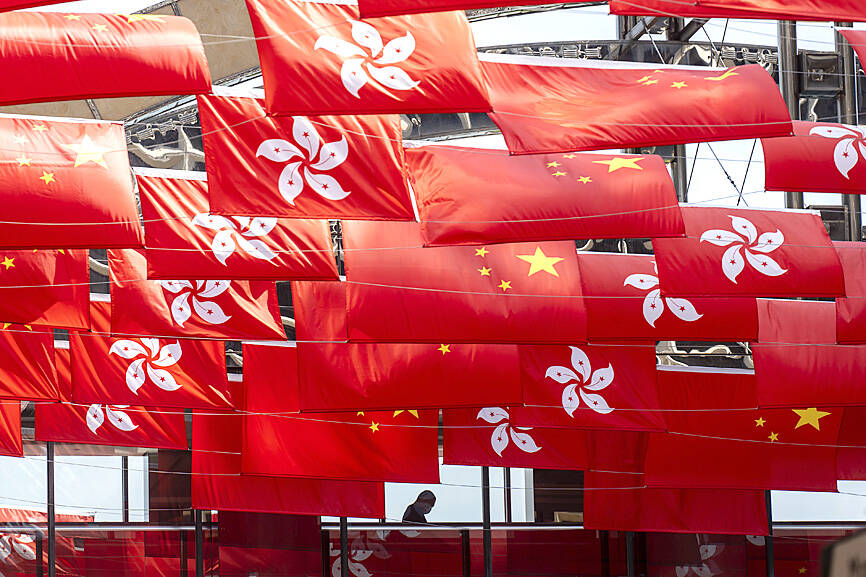The Mainland Affairs Council (MAC) has released new guidelines advising government employees visiting Hong Kong and Macau not to take part in any activity that could be construed as contravening the Chinese territories’ new national security law.
Officials from the Executive Yuan and its affiliated organizations or agencies should also refrain from making comments deemed illegal by the territories’ governments and not visit “banned areas,” the council said.
The council recently amended the Regulations for Executive Yuan and Affiliated Organizations and Agencies on Visiting Hong Kong or Macau (行政院及所屬各機關(構)人員赴香港或澳門注意事項) following the Hong Kong government’s passage in March of the Safeguarding National Security Ordinance, commonly known as Article 23.

Photo: AP
According to an unnamed source, the Executive Yuan has notified ministries and agencies that the amendment takes effect immediately.
The amendment urges government officials traveling to Hong Kong or Macau to attend events or meetings to plan their trips carefully, avoid discussing sensitive matters, and assess and form contingency plans regarding possible risks.
Government officials can solicit the opinions of the council if necessary, the statement said.
Officials should observe standing regulations and refrain from taking official files unrelated to the events or meetings they would attend in Hong Kong or Macau, and ensure that any cellphones or laptops they carry contain only information about those events or meetings, the statement said.
Officials traveling to Hong Kong or Macau should, in principle, take planes or ships operated by Taiwanese companies whether on official business or not, the amendment states.
During their stay in Hong Kong or Macau, government officials should refrain from speaking or acting in ways which the local governments would consider illegal.
Additionally, they should not stray close to “banned areas” as defined by the national security laws.
Article 23 states that any acts of espionage, defined as infiltrating, coming near to or investigating “banned areas,” either in person or via uncrewed vehicles, or attempts to intercept communications to obtain directly or indirectly helpful information benefiting foreign forces, could be punishable by imprisonment for 20 years.
Banned areas are defined as military or national defense-related areas within the Hong Kong and Macau regions, areas that the Garrison Law designate as off-limits military areas, or locations and transportation facilities that the local governments occupy for military or national defense purposes.
Officials are also advised to be cautious, travel in groups and not visit areas with known protests or processions or enter questionable facilities alone, the council said.
If officials experience any attempts by the Chinese authorities to detain, arrest, restrict their freedom of movement, search or interrogate them, they should contact the MAC Hong Kong or Macau office for assistance, the council said.

The Ministry of the Interior (MOI) is to tighten rules for candidates running for public office, requiring them to declare that they do not hold a Chinese household registration or passport, and that they possess no other foreign citizenship. The requirement was set out in a draft amendment to the Enforcement Rules of the Public Officials Election and Recall Act (公職人員選舉罷免法 ) released by the ministry on Thursday. Under the proposal, candidates would need to make the declaration when submitting their registration forms, which would be published in the official election bulletin. The move follows the removal of several elected officials who were

The Republic of China (ROC) is celebrating its 114th Double Ten National Day today, featuring military parades and a variety of performances and speeches in front of the Presidential Office in Taipei. The Taiwan Taiko Association opened the celebrations with a 100-drummer performance, including young percussionists. As per tradition, an air force Mirage 2000 fighter jet flew over the Presidential Office as a part of the performance. The Honor Guards of the ROC and its marching band also heralded in a military parade. Students from Taichung's Shin Min High School then followed with a colorful performance using floral imagery to represent Taiwan's alternate name

FOUR DESIGNATED AREAS: Notices were issued for live-fire exercises in waters south and northwest of Penghu, northeast of Keelung and west of Kaohsiung, they said The military is planning three major annual exercises across the army, navy and air force this month, with the navy’s “Hai Chiang” (海強, “Sea Strong”) drills running from today through Thursday, the Ministry of National Defense said yesterday. The Hai Chiang exercise, which is to take place in waters surrounding Taiwan, would feature P-3C Orion maritime patrol aircraft and S-70C anti-submarine helicopters, the ministry said, adding that the drills aim to bolster the nation’s offshore defensive capabilities. China has intensified military and psychological pressure against Taiwan, repeatedly sending warplanes and vessels into areas near the nation’s air defense identification zone and across

A Chinese takeover of Taiwan would severely threaten the national security of the US, Japan, the Philippines and other nations, while global economic losses could reach US$10 trillion, National Security Council Deputy Secretary-General Lin Fei-fan (林飛帆) wrote in an article published yesterday in Foreign Affairs. “The future of Taiwan is not merely a regional concern; it is a test of whether the international order can withstand the pressure of authoritarian expansionism,” Lin wrote in the article titled “Taiwan’s Plan for Peace Through Strength — How Investments in Resilience Can Deter Beijing.” Chinese President Xi Jinping’s (習近平) intent to take Taiwan by force